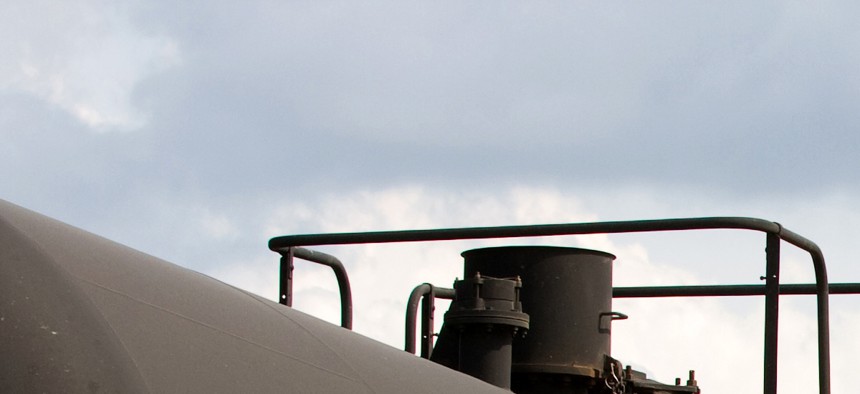Feds Seek to Prevent Deadly Oil Train Accidents

The U.S. Department of Transportation announced it is working on new safety rules for trains carrying crude-oil shipments. Shutterstock

Connecting state and local government leaders
North Dakota oil boom and rail incidents prompt new federal guidelines as local governments take action, too.
Federal regulators are preparing to mandate stronger rail-tank safety standards and speed restrictions for the transport of crude oil and other flammable materials like ethanol by train. The U.S. Department of Transportation on Wednesday released details of its proposed new rules for trains carrying large quantities of the hazardous materials.
Safety of these rail shipments has been a major issue for many states and cities, especially as the Bakken oil boom in North Dakota and the expansion of domestic oil and gas drilling in other parts of the country have sent more potentially explosive trains along rail lines that go through heavily populated and environmentally sensitive areas.
“Safety is our top priority, which is why I’ve worked aggressively to improve the safe transport of crude oil and other hazardous materials since my first week in office,” Transportation Secretary Anthony Foxx said in a statement. “While we have made unprecedented progress through voluntary agreements and emergency orders, today’s proposal represents our most significant progress yet in developing and enforcing new rules to ensure that all flammable liquids, including Bakken crude and ethanol, are transported safely.”
During a Monday National Press Club luncheon, Foxx said the issue “has to be dealt with comprehensively,” according to Bloomberg BNA, adding that new rail-car safety standards are “one piece of it, but speed is an issue.”
According to the Transportation Department:
The safety risk presented by transporting Bakken crude oil by rail is magnified both by an increasing volume of Bakken [crude oil] being shipped . . . throughout the U.S. and the large distances over which the product is shipped. In 2008, 9,500 rail-carloads of crude moved through our country compared to last year, when there were 415,000 rail-carloads. Moreover, on average Bakken crude oil shipments travel over 1,000 miles from point of origin to refineries on the coasts.
Major incidents like 2013’s deadly oil-train explosion in Lac-Mégantic, Quebec, that killed 47 local residents, and other derailments in places like Philadelphia and Vandergrift in Pennsylvania Roanoke, Virginia and Casselton, North Dakota, among other places, have caused many state and local officials to consider measures to mandate higher safety standards and transparency of shipments by railroads.
In New York state, CSX Transportation sends 15 to 30 trains each carrying 1 million gallons of North Dakota Bakken crude through the densely populated Hudson Valley every week on their way to refineries in New Jersey and beyond, the Journal News recently reported.
This spring, New York Gov. Andrew Cuomo urged federal action to boost rail safety standards.
“New York is taking aggressive steps to protect our communities from potential risks created by trains moving massive amounts of crude oil through our state,” Cuomo said in a statement at the time. “While rail transportation of crude oil has risen dramatically, federal regulations and safety precautions have lagged behind.”
In California, state lawmakers have already approved new fees for railroads carrying oil, according to the Los Angeles Times, and have been considering tougher rules mandating that railroads release more information about such trains passing through cities and towns.
In South Portland, Maine, members of the city council voted on Monday to ban the export of unrefined crude from its port facilities because of safety concerns, The Boston Globe reported.
Local measures like the one in South Portland have been a growing concern for the energy sector. “The ordinance sends a chilling message to businesses of all kinds,” Jamie Py, president of the Maine Energy Marketers Association, said, according to the Globe. “It says that this city council will kowtow to a small group of activists and arbitrarily ban a legitimate business operation.”
Now the industry is facing the likely prospect of tougher federal rules.
American Petroleum Institute President and CEO Jack Gerard on Wednesday pushed back on DOT assertions that transporting Bakken crude oil is more dangerous than other crudes, saying that the department “needs to get this right and make sure that its regulations are grounded in facts and sound science, not speculation.”
(Image via Steven Frame/Shutterstock.com)
NEXT STORY: States Would Sue to Kill City Internet Service





